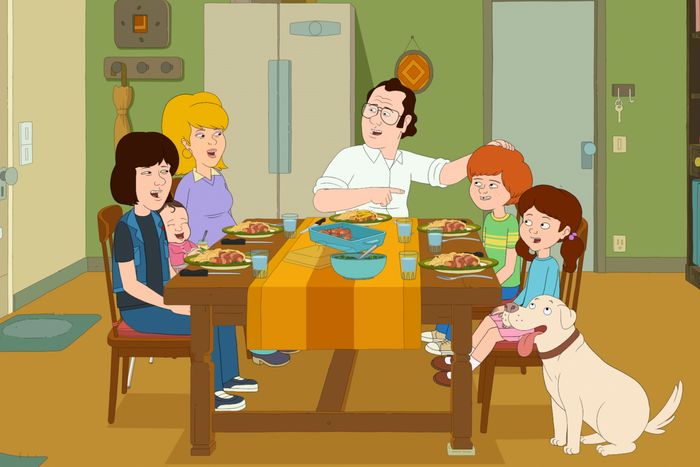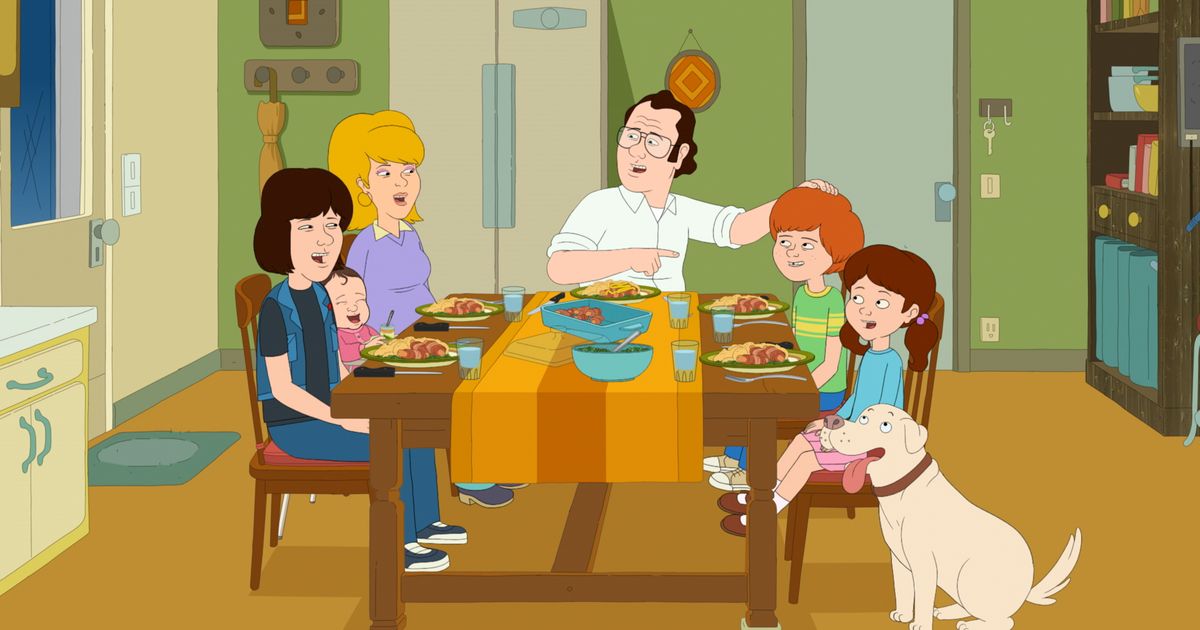
Looking for some quality comedy entertainment to check out? Who better to turn to for under-the-radar recommendations than comedians? In our recurring series “Underrated,” we chat with writers and performers from the comedy world about an unsung comedy moment of their choice that they think deserves more praise.
Alanna Ubach has been a welcome Oh my God, she’s here! presence in film and TV for years. Legally Blonde, Waiting …, Bombshell, Euphoria — she stays booked and busy. Ubach brings a wide-eyed mania to even the wine-drunk sleepiest characters (looking at you, Judge Jeanine). On the Ted prequel series, she plays the second permissive mom named Suze of her career, who brings a maternal presence to the talking teddy bear and teenage Mark Wahlberg alike.
Ubach has also done lots of voiceover work, so she knows cartoons. That’s why when she says F Is for Family is her new Sopranos, take notice. The Netflix show, created by Bill Burr, lasted for five seasons of highly specific Boston nightmare. The show is based on Burr’s childhood, warts and all. Those warts included racism, drinks, and racist drunk driving with kids in the front seat. “In spite of the cynicism, love is the foundation of the comedy,” she says. “It is all heart at the core of the show.” Here’s why Ted’s Alanna Ubach says F Is for Family is a perfect love letter to the ’70s.
Why F Is for Family?
F Is for Family has all of the caramel and nougat and chocolate and peanuts that a 2023 animated show should have. Bill Burr plays this amazing, disgruntled, very, very angry family guy who’s basically been drafted into this archetypal American suburban nightmare. He’s perfect. It takes place in the ’70s, and it brings back so many things that I forgot about — things that people got away with: no seat belts in the cars for the kids, and the metal lunch boxes. It’s perfect.
What did people get away with?
I have fond memories of my father just dropping me off at the video store and saying, “You can rent whatever you want, mija. I’ll be back in about ten minutes. I’m going to go smoke a cigarette.” So I would come out with rentals of I Spit on Your Grave and Summer Lovers and Sid and Nancy and When a Stranger Calls. My father wouldn’t ask any questions. I was like 8 years old, and I’d be popping these things in the VCR, and my mom and dad would never say, “Absolutely not. What is this cover? You are not allowed to watch I Spit on Your Grave.” But I did.
I mean, that’s what happens when you have immigrants for parents. My sister convinced my family to buy her a moped when she was 14. She said, “Dad, yeah, you can be 14 and ride a moped. We’ll put it under your name. Say you’re buying it and I can ride a moped to school.” Of course, she crashed it the first week she had it. But I mean, those were the perks of having immigrants for parents. One of the many.
Speaking of details that I feel the show got right, the food looks disgusting.
From the furniture to the food, everything seemed to be mustard yellow or avocado green. My mom was obsessed with avocado green and Louis XIV furniture. Because it made us look rico, right? We lived in the Mexican Beverly Hills — which was Downey — back in the ’70s. So my mom had the Louis XIV furniture, and we were not allowed to touch her giant bowl of ceramic grapes. It was a no-no!
I wonder what it is about fake grapes. I was a ’90s kid, and instead of ceramic grapes, we had the olive oil and red-wine vinegar bottles in the shape of grapes. Do you remember those?
Oh wow. Were you rich? Was anything roped off in your house? Our living room was roped off. I was not allowed to go in there as a little girl. Super weird.
What do you think the show gets from being set in the past? There were contemporary satires in the ’70s, many by the late great Norman Lear, but does the distance of time add anything?
There was a lot of innocence back then. This was all pre-internet. We didn’t have information at our fingertips at any given moment. People who wanted to talk to you gave you a phone call. There was something called a landline. We had pay phones and pagers. So when we were paged and it was 911, you had to pull over and find a pay phone to call your parents. It’s basically a walk down nostalgia lane. It’s a love letter to the 1970s. And like Norman Lear, in spite of the cynicism, love is the foundation of the comedy. It is all heart at the core of the show.
That’s kind of what Ted is doing for the ’90s too.
Absolutely, 100 percent. Here’s this vulgar teddy bear who is essentially the uncle who just got out of prison, who has watched a lot of television, and that has been his source of education, and he is this best friend to a young boy who basically wished him alive. And I think it’s one of the most unique comedies that’s ever been made, in my humble opinion.
How do you feel about Bill Burr’s decision to basically play his own dad? That’s got to be a mindfuck.
Oh sure. Just knowing him on such a cellular level, and then thinking I’ll never become my parents. And then before you know it, you start quoting them and singing all the corny songs they used to sing, and you always become one of your parents. Watch out. It’s either your mother or your father. Take your pick.
Speaking of becoming my mother, at first this show was too mean for me. That’s a classic “my mom” thing. How mean do you like your comedy?
Well, it’s so funny because to me, my father’s Puerto Rican, my mother’s Mexican, and they would fight in Spanish when they didn’t want us to know what they were talking about. And we were loud. So profanity, to me, is just music in my ears. My ears sort of perk up and think, Mom! Dad! It’s so familiar to me.
My parents weren’t particularly conservative or religious. We were “Christmastime Catholics,” as my mom used to call it. And when I asked her “Mom, where did Santa come from?” she’d look at me and say, “Nordstrom. Don’t be stupid.” So that was the kind of family I had. We were very flamboyant. So the dirtier, the more vulgar, the more crass and garish, the better.
I feel like family sitcoms are often organized around one space where all the group scenes take place. F Is for Family, like Ted, is a dining-table show. But my family was a rec-room family. What kind of family were you? Your living room was off-limits. So were you dining room, kitchen room?
The living room was only for Christmas and maybe Easter, if I was lucky. If the actual rope was not there, then I would know that there were probably a couple of hidden Easter eggs around the couches and the Lladró collection.
I would say we were more of a dinner-table family. That being said, I think my mom was probably one of the most challenged cooks I will have ever known. I didn’t know food could taste as good as it tastes until I ate a meal at Denny’s. One time when I was 8 years old, I had fried chicken and mashed potatoes, and I thought, My mom is a terrible cook.
This show has some really heavy hitters in its cast. Laura Dern as a sitcom mom?
They were so lucky to have these A-list actors come on board, because there’s such a naturalism to the delivery of the dialogue. That’s really what makes it so wonderful: The hilarity comes from the hyperrealistic delivery of very absurd dialogue. That can only really be done by these A-list actors. A lot of the time, you’ll hire voiceover actors who are in animation, and they will go the Mel Blanc route and really find that more hyper-cartoony take on these characters. So the fact that they are given the voices by these A-list actors is such a treat, and it really does ground it.
You don’t think about a cartoon being naturalistic.
Right? You don’t. And then all of a sudden you’re like, I just binge-watched F Is for Family. My God, this is my new Sopranos.
I feel like that again goes back to Ted, where you’re bringing these very grounding acting techniques to the talking-bear show.
That was very, very important. When we did the first table read and I realized how natural Giorgia Whigham and Max Burkholder were, I thought, Oh, I better back up. A little bit less mayo on the sandwich.
How do you figure out how to gel into that authentic loving, sometimes frustrated family dynamic? How hard is it to find that alchemy as an actor?
Everyone has a family. And you know what? Every family’s dysfunctional. If people tell you that they were raised by this wonderful, functional household, they’re lying. You just have to say “family.” You don’t have to say “dysfunctional.”
And how did you find how much accent to put in the performance?
There was this wonderful dialect coach who I worked with. I would have her record my dialogue in every episode, and then I would just listen to it on my voice memos over and over and over again. So by the time we were filming, it was sort of second nature to me. But Bostonian, that is one heck of a challenging accent.
This show is obviously set during fictional Mark Wahlberg’s childhood. What’s it like being stuck into a period piece for a whole series?
It’s so much fun. I’m 48 years old. I was a teenager back in the ’90s. I was obsessed with what socks I was going to wear and frozen yogurt. To see Giorgia Whigham as myself back then is so much fun. Oh, I remember those Doc Martens with the floral dresses. And I mean, talk about sense memory.
Does it give you a new perspective to play the mother figure to a character you see as yourself?
I based this woman on a nun I once knew. Her name was Sister Mary, and she taught catechism class at Our Lady of Perpetual Help in Downey. Sister Mary found the joy in everything. She had a very soft-spoken voice, and we could barely hear her when she was teaching the class. I grew up in an emotional war zone, so Sister Mary, to me, was an alien. But when I read the role of Susan, I thought, Oh, this is Sister Mary. I sprinkled a little bit of my kookiness on top, and voila! There was Susan Bennett. But yes, you think, Oh my gosh, I’m now the age that my mom was back when blah, blah, blah happened. Especially the hair. I think the hair says it all.
See All
